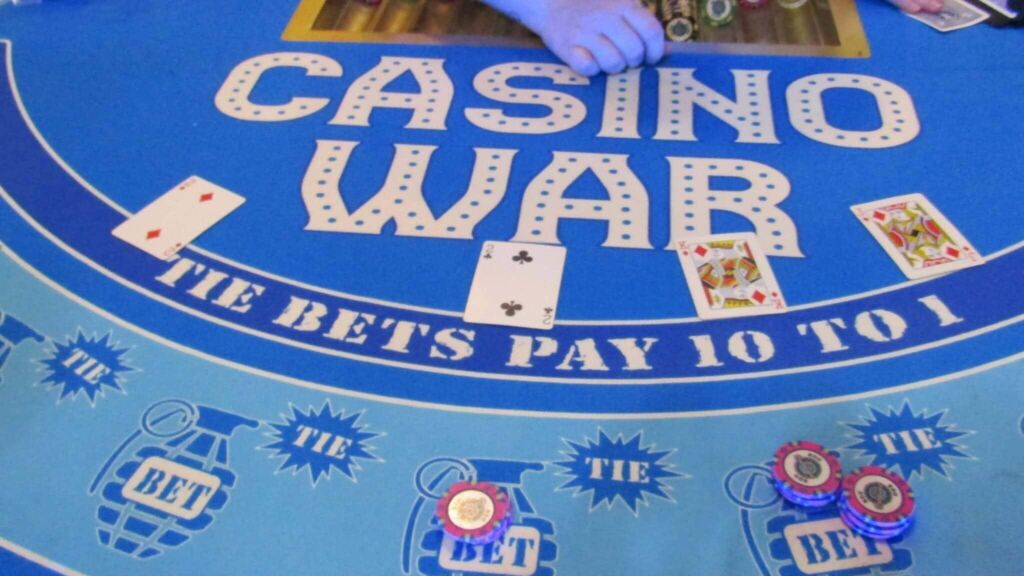Amidst the rapid and unpredictable environment of casino gambling, mastering the games is fundamental for both fun and strategy. Casino War stands apart with its plain and fast gameplay. In Casino War, when a player and dealer hold cards of the same value, it leads to a 'War,' a tie-breaking moment that adds excitement. This article thoroughly explores the War tie-breaker rule in Casino War, offering deep insights for both inexperienced and experienced players who seek to understand this game better.
Learning the Fundamentals of Casino War.
At its core, Casino War is notably straightforward, resembling the children's card game 'War.' The casino variation maintains its simplicity and adds aspects that appeal to gamblers. A standard 52-card deck, or sometimes six decks shuffled together, is used in the game, played against a casino dealer. The goal is simple: have a higher-ranking card than the dealer's.
The game begins when players place a wager known as the ‘Ante’ before any cards are dealt. Both player and dealer then receive one card each. Card ranking is according to poker standards, with Aces high and 2s as the lowest. The suits don’t influence the card’s rank. After receiving cards, players and dealer compare the rank.
Within the main game, three results are possible:
- Player Triumphs: A player wins if their card outranks the dealer’s and earns even money on their Ante bet.
- Dealer Triumphs: The player loses their Ante if the dealer’s card has a higher rank.
- Tie (War): When both the player’s and dealer’s cards match in rank, a tie occurs, leading to the 'War.'
Casino War's initial simplicity makes it exceptionally accessible for beginners. However, complexity and strategic elements emerge when a tie happens and escalates the game into 'War.'
Exploring the Details of the War Tie-Breaker Rule.
The 'War' tie-breaker is the standout feature of Casino War, setting it apart from a simple card game. When a tie emerges, players face a critical choice: surrender or proceed to war. This decision deeply impacts the odds of the game and potential rewards.
Option 1: Surrender. Opting to surrender is a straightforward and lower-risk choice. If players decide to surrender, they give up half of their original Ante bet. This concludes the round, allowing new bets for the next one. Surrendering adopts a careful approach, minimizing potential losses from a tie.
Option 2: Proceed to War. A more daring and potentially rewarding option involves 'going to war.' This requires matching the initial Ante bet with an additional equal bet, known as the 'War bet.' Players must make this second bet to engage in War; otherwise, surrender is the only alternative.
Once a player decides on war and places the additional bet, the following occurs:
- Card Burning: In many Casino War versions, after choosing war, three cards from both the player’s and dealer’s sides are dealt face down and discarded, altering the deck for the War cards slightly.
- Dealing the War Cards: After burning cards, both player and dealer receive a new card face up. These 'War cards' determine the tie-breaker.
- Comparison of War Cards: Similarly to the main game, the player’s and dealer’s War cards are ranked and compared.
The War’s result depends on comparing these 'War cards':
- If a player's War card ranks higher than the dealer’s, they succeed. The payout is crucial: the player receives even money on their War bet, but the initial Ante bet is usually a push, returned without extra winnings.
- If the dealer’s War card ranks higher, the player forfeits both the War and Ante bets, resulting in a notable loss.
- In rare yet possible cases, War cards tie again. Typically, in Casino War rules, a second tie awards the player both bets. Some casinos might have variations like a second War or different payouts, but winning both in a second tie is common.
Knowing these potential scenarios and payouts is vital for making wise choices during a Casino War tie. Surrendering or engaging in War affects the game’s risk and rewards.
Strategic Impact of the War Tie-Breaker.
The War tie-breaker rule infuses strategic decision-making into what is otherwise based on luck. While the card comparison initially hinges on chance, choosing to surrender or proceed to war provides players with a tactical decision. Grasping the odds and potential results is crucial for optimal Casino War play.
War Odds and Probabilities. Statistically, ties in Casino War occur roughly 7.5% to 9% of the time with a 52-card deck, depending on the deck count in play. When a tie occurs and war is chosen, drawing War cards remains a game of chance, yet the payout and cost impact the expected value.
Going to war essentially involves a second bet equivalent to the first. Winning gives even money on the War bet, with the Ante pushing. This payout favors the house slightly in war scenarios. If the player also won even money on both bets when victorious in War, odds could shift to player advantage in some cases. However, the customary Ante push preserves the casino’s edge.
Choosing Surrender or War: Mathematically, the best approach in Casino War, given standard payout rules, is nearly always to go to war. While surrendering seems loss-cutting, the result is a guaranteed 50% loss of the initial bet. In contrast, war, though requiring another bet, presents a chance to reclaim the War bet and push the Ante.
Casino War’s house edge largely comes from the War tie-breaker rule. By repeatedly choosing war, players minimize the house edge to its lowest, around 2.88% with one deck and somewhat higher with multiple decks. Frequent surrendering raises the house edge, making it less strategic long-term.
However, some players may surrender for budget management or to avoid big losses in a single round. If a player is on a tight budget or avoids larger losses in one hand, surrendering means controlled spending. Psychologically, surrendering can lessen the emotional toll of potentially losing both bets.
Despite psychological facets, from a math standpoint, continually choosing war is the strategic route to reduce losses and prolong gameplay with your bankroll in Casino War.
Variations in Tie-Breaker Rules
Although the standard War tie-breaker explained here is common, casinos might alter it for novelty or dynamic shifts. Players should be aware of such variations as they affect the odds and strategies.
Enhanced Rewards for Winning Wars. In certain casinos, you might encounter special promotions or unique Casino War variations that offer better rewards for winning a War. Typically, instead of the standard practice where you get even money back on the War bet and the Ante remains unchanged, some casinos offer even money on both bets if you win a War. This favorable rule shift can significantly improve your chances during the War and decrease the house advantage, making the game more attractive. It's always wise for players to carefully examine payout tables and rule changes, as these can greatly influence how favorable a game might be.
Altering the Number of Burn Cards. Usually, the norm is to burn three cards before dealing the War cards, which is a widespread rule. However, a casino could, in theory, decide to change this number. Although this tweak has a slight influence on the deck composition for War cards, it doesn't drastically change the game's odds. Instead, it offers a slightly different experience in the gameplay rather than affecting the chances of winning.
Double Tie Outcomes and Payout Adjustments. Typically, when a second tie happens during a War, it results in a victory for the player on both bets. However, in rare cases, a casino might have a different outcome for successive ties, such as triggering an additional War sequence or modifying the payout structure. It's important for players to fully understand the rules regarding consecutive ties, especially when playing in lesser-known casinos or unique online versions, to avoid surprises.
Exploring Side Bets and Tie Incentives. To increase complexity and offer chances for bigger wins, some Casino War versions introduce side bets, often centered on ties. A popular side bet involves wagering that the initial hand will result in a tie, usually offering much higher payouts such as 10 to 1 or more, due to the lower likelihood of ties. While such side bets can be enticing with their big potential payouts, they generally come with higher house edges than the main game and should be approached cautiously. Additionally, there might be bonus payouts if the player wins the War with a specific card like an Ace, adding to the excitement but also complicating the calculation of odds and strategies.
Before diving into Casino War, especially at a new casino or online site, it's important to study the specific rules and payout arrangements. Differences in rules, particularly regarding the War tie-breaker and side bets, can greatly affect the expected value of the game and how players should strategize.
Mental and Emotional Dynamics of the War Decision
Beyond the mere numbers and tactics, the War tie-breaker in Casino War carries considerable psychological and emotional significance for players. Gambling is not just about statistical probabilities; it's also an emotional journey filled with excitement, risk, and emotional regulation. The War aspect of Casino War encapsulates this intricate balance between chance, choice, and emotional reaction.
The Excitement of Declaring War. The expression 'going to war' invokes imagery of entering a high-stakes scenario with the prospect of substantial rewards. When a tie arises, players aren't just facing a draw; they encounter a challenge. Opting to go to war is seen as a bold, risk-taking maneuver, appealing to those who thrive on risk and the potential for big wins. This decision resonates with the gambler's quest for thrill and adventure, turning a straightforward card game into an emotionally intense encounter.
Loss Aversion and Deciding to Surrender. On the flip side, the option to surrender ties into the concept of loss aversion. For some players, particularly those who are cautious or have limited funds, the notion of cutting losses immediately through surrendering can be appealing. It provides a sense of control and a way to limit losses upfront, even if it's not the statistically best long-term approach. The immediate emotional relief from minimizing losses can sometimes outweigh the potential downsides of giving up.
The Emotional Impact of Winning or Losing Wars. Achieving victory in a War can be extremely fulfilling. Successfully tackling the tie-breaker and winning, even if just with even money on the War bet and a neutral result on the Ante, can instill a sense of achievement and validate the choice to go to war. The thrill of overcoming a tie and then succeeding can offer more satisfaction than a typical win in the main game.
Conversely, losing a War can be equally profound, but negatively so. Experiencing losses on both the War and Ante can feel like a notable setback, particularly if it happens repeatedly in one session. Such losses can lead to frustration, especially if the player believes they made the 'correct' strategic choice to go to war but simply met with bad luck. Navigating these emotional highs and lows—the joy of winning Wars and the disappointment of losing them—is part of the Casino War journey.
Strategic Budget Management and Emotional Regulation. Grasping the psychological elements of the War rule is crucial for proficiently managing your bankroll and emotional responses while playing. Players should recognize their own tolerance for risk and emotional reactions to wins and losses, especially during Wars. It's wise to set betting limits, decide beforehand the number of Wars willing to be played per session, and brace for the emotional fluctuations of the game, all key aspects of playing responsibly in Casino War.
Ultimately, the War tie-breaker rule is more than just a game feature; it's an emotional pivot in Casino War. It adds a point of decision-making that involves players beyond mere chance, inviting them to consider risk, reward, and their own psychological reactions to the gamble's unpredictability.
Expert Advice for Casino War Tie-Breaker Strategies
Even though Casino War is largely governed by chance, knowing the War tie-breaker rule and its consequences can help players make better decisions and potentially prolong their enjoyment and gameplay. Consider these expert tips for handling War tie-breaker scenarios:
- Consistently Choose War (Optimal Move). As frequently mentioned, the sound mathematical strategy usually involves going to war when a tie occurs. Choosing to surrender amplifies the house edge. Embrace the War as an integral part of the game and incorporate it into your financial planning.
- Be Informed About Payout Structures. Understanding the payout rules for triumphing in a War, particularly regarding the Ante bet, is crucial. Typically, even money is given on the War bet with a push on the Ante. Be cautious of variations that might change these terms, and adjust your approach if you encounter more beneficial payout rules.
- Avoid Card Counting Myths. Unlike games like Blackjack where card counting can be advantageous, in Casino War and particularly in War tie-breakers, card counting is mostly ineffective. The rapid pace and the use of burn cards make it challenging to track card values in a manner that would profoundly influence War decisions. Instead, focus on the basic strategy of consistently choosing War.
- Plan Your Finances for Wars. Since choosing War requires doubling your initial wager, include this in your financial management strategy. A tie followed by War increases the stakes for a single hand. Ensure that your gambling funds support engaging in Wars without rapidly draining your bankroll. Plan session budgets and adhere to them, incorporating possible War bets into your total spend.
- Approach Side Bets Carefully. While tie side bets might lure players with the promise of substantial payouts, remember their considerably higher house edges. If you opt to place such bets, do so with caution and minimal sums, primarily for entertainment, acknowledging they are statistically less favorable than the basic game and the fundamental War decision.
- Gain Experience Online (Free Play). For newcomers to Casino War or those desiring more confidence with War tie-breakers, using free play options at online casinos is helpful. It allows you to familiarize yourself with the game, practice making War choices, and comprehend its flow without financial risk.
- Know When to Walk Away. Like any casino game, Casino War is crafted for entertainment but also encompasses inherent risks. Establish win and loss boundaries for each gaming session. If you hit a winning streak or your objective, consider terminating the session while ahead. Conversely, if losses mount, halt to prevent a futile chase. Emotional discipline is vital for responsible gaming, especially in fast-paced games like Casino War.
By mastering and applying these expert recommendations, players can approach the Casino War tie-breaker with increased confidence and strategic insight, enriching their overall playing experience.
Final Thoughts: The Influential War Rule in Casino War
The War tie-breaker rule is not just a contingency plan in Casino War; it represents a moment where the game's simple format shifts into a realm of decision, risk, and potential reward. This rule transforms Casino War from a basic card comparison into a distinct casino game with its own character and strategic depth. For players, comprehending the War rule is essential for fully understanding the game's subtleties and making informed decisions.
Casino War, at its core, depends heavily on luck, with the potential to introduce a bit of strategy through the War tie-breaker. Here, players can decide whether to concede or continue battling. From a mathematical perspective, the smartest move is to always choose war to cut down the casino’s advantage. Yet, deciding whether to surrender or go into battle isn't merely mathematical; it also involves the thrill of taking risks and handling potential losses, adding an emotional depth to the game. Engaging in war is more than abiding by the rules; it’s a call for players to delve into the game’s dynamics, balancing risks with potential rewards and experiencing the emotional highs and lows that come with gambling.
For newcomers to gambling, Casino War offers an easy introduction to the world of casino games. The War rule, in particular, serves as a primary example of making choices when outcomes are uncertain. Seasoned players might relish the game, especially the War situation, for its swift pace and the straightforward yet engaging strategy it demands. Whether players are in it for sheer fun or to learn basic gambling strategies, the War tie-breaker stands as a crucial and defining aspect of Casino War, making every tied round a significant and dramatic point in the game’s progression.
External Resources:



